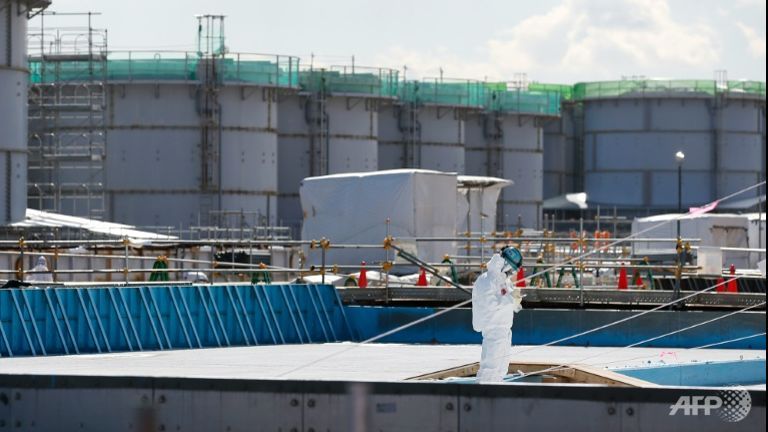Ex-TEPCO executives indicted over Fukushima accident
 |
| A worker takes notes in front of storage tanks for radioactive water at Tokyo Electric Power Co's tsunami-crippled Fukushima Daiichi nuclear power plant (Photo: AFP/Toru Hanai) |
TOKYO: Three former executives of the crippled Fukushima nuclear plant operator were indicted on Monday over the 2011 atomic accident, in what will be the first criminal trial linked to the disaster.
Ex-Tokyo Electric Power (TEPCO) chairman Tsunehisa Katsumata, then-vice president Sakae Muto and former vice president Ichiro Takekuro, were formally charged with professional negligence resulting in deaths and injury.
The trio were not taken into custody.
"We were notified from our lawyers that the three were indicted," a spokeswoman for a campaign group pushing for a trial told AFP.
The announcement comes after a judicial review panel composed of ordinary citizens ruled in July -- for the second time since the accident -- that the trio should be put on trial, compelling prosecutors to press on with the criminal case under Japanese law.
Prosecutors had twice refused to press charges against the men, citing insufficient evidence and little chance of conviction.
It will be the first criminal trial over responsibility for the tsunami-sparked reactor meltdowns that forced tens of thousands from their homes in the worst nuclear accident since Chernobyl.
Japan's public broadcaster NHK said the three were going to plead not guilty to the charges, arguing it was impossible to predict the size of the massive tsunami that slammed into Japan's northeast coast.
Although the March 11 earthquake and tsunami killed 18,500 people, the nuclear disaster it caused is not officially recorded as having directly killed anyone.
Japanese media said the charges are tied to the deaths of more than 40 already ill people living around the plant who were hastily evacuated from the area and later died.
Around a dozen others -- including TEPCO employees and members of Japan's Self Defense Forces and -- were injured during the accident.
A report released by the International Atomic Energy Agency last year said a misguided faith in the complete safety of atomic power was a key factor in the Fukushima accident, pointing to weaknesses in disaster-preparedness and in plant design along with unclear responsibilities among regulators.
A 2012 parliamentary report also said that Fukushima was a man-made disaster caused by Japan's culture of "reflexive obedience", but no one has been punished criminally.
An angry public has increasingly pointed to cosy ties among the government, regulators and nuclear operators that have allegedly insulated TEPCO executives from being charged.
Campaigners have called for about three dozen company officials to be held accountable for their failure to take proper measures to protect the site against the tsunami.
What the stars mean:
★ Poor ★ ★ Promising ★★★ Good ★★★★ Very good ★★★★★ Exceptional
Latest News
More News
- State corporations poised to drive 2026 growth (February 03, 2026 | 13:58)
- Why high-tech talent will define Vietnam’s growth (February 02, 2026 | 10:47)
- FMCG resilience amid varying storms (February 02, 2026 | 10:00)
- Customs reforms strengthen business confidence, support trade growth (February 01, 2026 | 08:20)
- Vietnam and US to launch sixth trade negotiation round (January 30, 2026 | 15:19)
- Digital publishing emerges as key growth driver in Vietnam (January 30, 2026 | 10:59)
- EVN signs key contract for Tri An hydropower expansion (January 30, 2026 | 10:57)
- Vietnam to lead trade growth in ASEAN (January 29, 2026 | 15:08)
- Carlsberg Vietnam delivers Lunar New Year support in central region (January 28, 2026 | 17:19)
- TikTok penalised $35,000 in Vietnam for consumer protection violations (January 28, 2026 | 17:15)
















 Mobile Version
Mobile Version